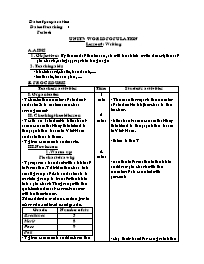Bài soạn môn học Tiếng Anh lớp 11 - Unit 7: World population - Lesson 4: Writing

A. AIMS
1. Objectives : By the end of the lesson, sts will be able to write descriptions of
pie charts, using appropriate language.
2. Teaching aids:
- blackboard, chalk, handouts, .
- textbook, lesson plan, .
B. PROCEDURES
Bạn đang xem tài liệu "Bài soạn môn học Tiếng Anh lớp 11 - Unit 7: World population - Lesson 4: Writing", để tải tài liệu gốc về máy bạn click vào nút DOWNLOAD ở trên
Date of preparation: Date of teaching : Period: Unit 7: world population Lesson 4: Writing A. Aims 1. Objectives : By the end of the lesson, sts will be able to write descriptions of pie charts, using appropriate language. 2. Teaching aids: - blackboard, chalk, handouts, ..... - textbook, lesson plan, .... B. Procedures Teacher’s activities Time Student’s activities I. Organization - T checks the number of students and asks Ss to make some class arrangement. II. Checking the old lesson - T calls on 1 student to talk about some causes that they think lead to the population boom in Viet Nam and solutions to them. - T gives comments and mark. III. New lesson 1. Warm- up: Pie chart drawing - T prepares a handout with a table of information. T divides the class into small groups of 4 sts and asks sts to work in groups to transfer the table into a pie chart. The group with the quickest and most correct answer will be the winner. The table shows the number of sts in class who achieved each grade. Grade Number of sts Excellence 5 Merit 8 Pass 9 Fail - T gives comments and declares the winner. 2. Preparing sts to write - T prepares a handout with a description of a pie chart. T asks sts to work in pairs to discuss the organization and other characteristics of the description. T asks some questions about the pie chart. - T writes some information about describing the pie chart on the board. * There are 3 parts in the description of a pie chart. + Introduction: describe what the chart is about, its date and location and say what overall trends . + Body: describe the most important trends. + Conclusion: sum up the global trend shown on the figure and compare them if possible. * Language use: Besides language and structures given in the book, there are some other language items: + make up less than .... + the most + adj ...... .......................... 3. Writing - Before sts describe the pie chart on page 86, T asks them to work in pairs to analyse the chart, focusing on the following questions. + What does the chart show? + What is the general trend of the chart? + Which region has the largest population? Which comes second? + ................................. - T checks the answers with the whole class. - T gets sts to write the description of the pie chart, using the sentence given in the book to begin their description. - T goes round to observe and offer help. 4. Feedback on sts’ writing - T asks sts to exchange their writing with another student for peer correction. - T goes round and collects mistakes - T collects some writing for quick feedback. - T writes sts’ typical errors on the board and elicits sefl and peer correction. - T provides general comments on the writing. IV. Consolidation - T summarises the main points of the lesson. V. Homework - T asks sts to write the description of the pie chart they have seen in the newspaper. VI. Feedback 1. Good points 2. Weak points 1 min 5 mins 4 mins 12 mins 13 mins 7 mins 2 mins 1 min - The monitor reports the number of students in his/her class to the teacher. - talk about some causes that they think lead to the population boom in Viet Nam. - listen to the T - use the information in the table and draw pie charts with the number of sts counted with percent. - clap their hand for congratulation - work in pairs to discuss the organization and other characteristics of the description. Then answer the questions about the pie chart. - listen carefully and copy down. - work in pairs to analyse the chart, focusing on the questions. - check together. - write description of the chart individually. - ask for help if necessary. - exchange their writing with another student for peer correction - show their writing - hand in their writing - sefl and peer correct - listen carefully and copy down. - take note - listen and note down
Tài liệu đính kèm:
 Writing 7.doc
Writing 7.doc





